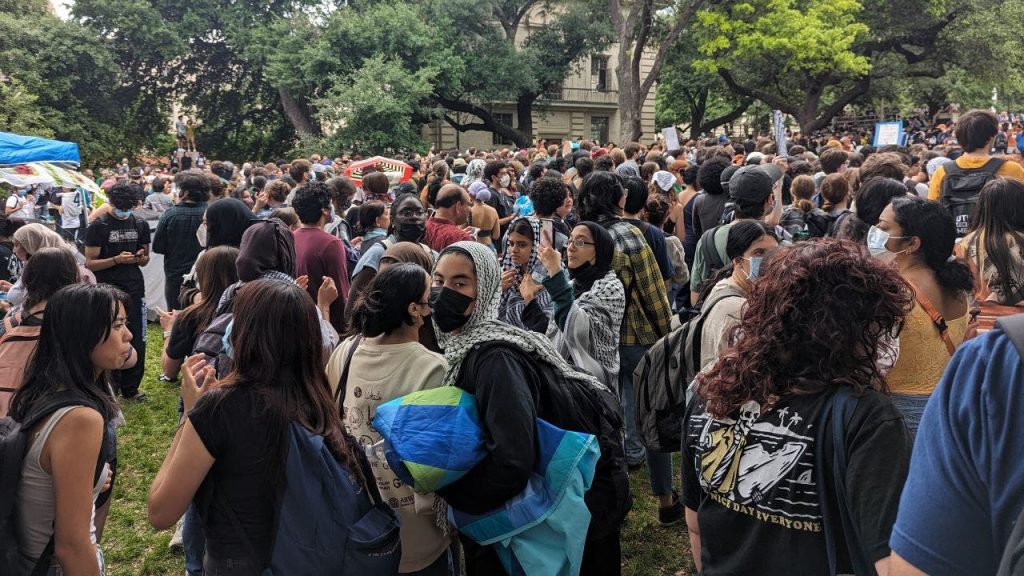Over 100 protesters gathered at the University of Texas at Austin for an anti-Israel demonstration that turned unruly, attracting onlookers who joined in on the chants. This is part of a trend of intensified anti-Israel protests on American college campuses amidst the ongoing conflict between Israel and Hamas in the Middle East. The Austin Police Department and Texas Department of Public Safety made arrests at the scene, with officers monitoring the protests on horseback. The protesters chanted slogans such as “APD, KKK, IDF / they’re all the same” and “Pigs go home!” while attempting to set up tents, but were stopped by the police. The DPS reported more than 20 arrests were made to prevent unlawful assembly and criminal activity.
Republican Governor Greg Abbott denounced the protests as lawless and antisemitic, stating that those participating should be jailed and expelled from public colleges and universities in Texas. UT Austin, in response to the disruptive protests, emphasized that they do not tolerate such behavior on campus and are focused on allowing students to finish classes and study for finals without interruption. The statement from UT Austin condemned the disruptions and affirmed their commitment to maintaining order on campus during critical times in the semester.
The protests at UT Austin are part of a larger wave of anti-Israel demonstrations on college campuses across the country. Columbia University in New York recently faced similar incidents, prompting the switch to hybrid learning on the main campus amidst the unrest. Anti-Israel protesters at Columbia University engaged in dramatic moments, creating chaos and drawing attention to the issue. These events highlight the ongoing tensions surrounding the conflict between Israel and Hamas, which have spilled over onto university campuses and led to clashes between protesters and law enforcement.
The anti-Israel protests at UT Austin and other American universities have sparked controversy and condemnation from politicians and officials, with concerns raised about the rise of antisemitism and disruptive behavior on campuses. Governor Abbott’s strong stance against the protests reflects a wider pushback against such demonstrations, with calls for law and order to be upheld and for those engaging in antisemitic actions to face consequences. The responses from government officials and university administrations emphasize the need to address and condemn hatred and intolerance on college campuses, where diverse viewpoints and peaceful dialogue should be encouraged.
The clashes at UT Austin between protesters and law enforcement highlight the challenges faced by universities in managing demonstrations and maintaining a safe and secure environment on campus. The arrests made by the Austin Police Department and Texas Department of Public Safety underscore the importance of upholding the rule of law and preventing disruptions that could impact academic activities and student life. The incidents at UT Austin serve as a reminder of the complexities involved in addressing controversial issues and balancing free speech rights with the need to ensure a respectful and inclusive campus climate for all students.
In conclusion, the anti-Israel protests at the University of Texas at Austin and other American universities reflect a broader trend of heightened tensions surrounding the conflict in the Middle East. The responses from government officials, law enforcement, and university administrations underscore the importance of maintaining order, condemning hate speech, and upholding the values of diversity and inclusion on college campuses. The incidents at UT Austin serve as a reminder of the challenges faced by universities in managing protests and creating a safe and respectful environment for students, faculty, and staff. Despite the disruptions and tensions, efforts continue to address the underlying issues and promote peaceful dialogue and understanding among diverse communities.


